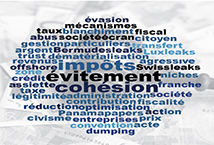- Home
- ESEC SCOPE
- Publications
- Tax avoidance mechanisms, their impacts on popular consent to taxation and social cohesion
Tax avoidance mechanisms, their impacts on popular consent to taxation and social cohesion
Visuel

Type of text :
Opinion and report
Type of referral :
Own initiative
Working group :
Section for Economy and Finance
Date d'adoption
Date adopted : 12/13/2016
Rapporteur(s) :
Photo

Antoine DULIN
Student Bodies and Youth Movements Group
Overview
Présentation
Grassroots mobilisation and the recent media coverage of certain scandals in France and worldwide (such as Swissleaks, Luxleaks, Panama papers, Bahama leaks and Football leaks to mention but a few) have brought to light the sheer extent of tax avoidance mechanisms and their impact on the funding of public services. The European Commission puts the loss of tax revenue every year at more than €1,000 billion for the European Union. In France, these estimations are in the range of €60 to 80 billion. Regarding developing countries, they would appear to be 30% more affected than OECD nations by this phenomenon, because of prejudicial tax treaties and failing government departments.
Tax avoidance involves the use of illegal mechanisms which are clearly prohibited by law or case law (especially abuse of rights, irregular management practices and other techniques which may be described as tax fraud punishable as a criminal offence), and the excessive use of legal mechanisms to the extent that it risks being prejudicial to and going against the general interest. Turned to their advantage by businesses and individuals alike, these mechanisms particularly exploit the legal loopholes of States through complex arrangements which make it possible to avoid paying taxes. With financial flows going paperless and the economy going digital, new challenges are emerging which, despite technological progress, are making the work of government departments more difficult.